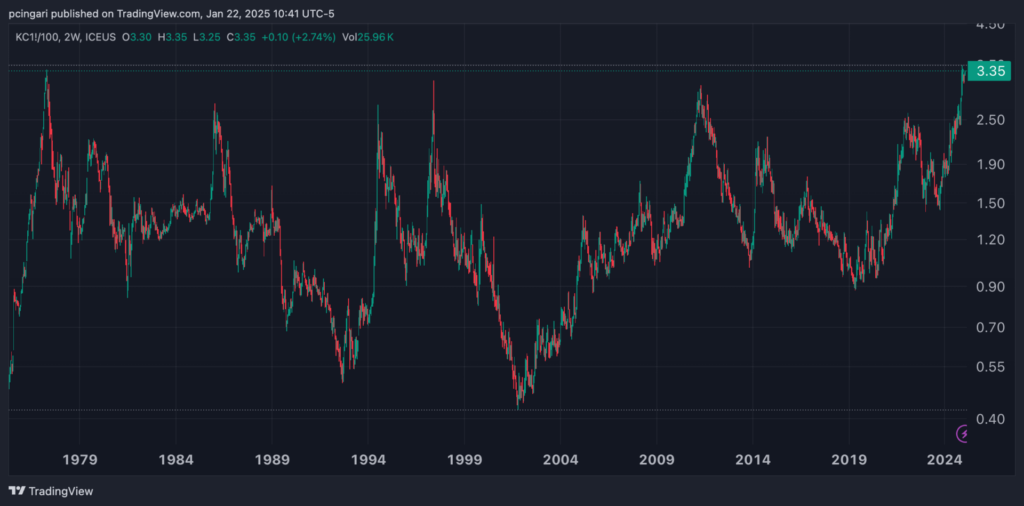Zinger Key Points
- Arabica coffee futures hit $3.35 per pound in January 2025, nearing 50-year highs after peaking at $3.48 in December.
- Starbucks relies on hedging strategies to offset price volatility, yet some inventory remains exposed to market swings.
- Pelosi’s latest AI pick skyrocketed 169% in just one month. Click here to discover the next stock our government trade tracker is spotlighting—before it takes off.
Arabica coffee futures have soared past $3.35 per pound in January 2025, holding near multi-decade highs after peaking at $3.48 in December, the highest level since April 1977.
In a note shared Wednesday, Bank of America analyst Sara Senatore said, “Coffee remains inflationary. For Q1 2025, average coffee price inflation is expected to be 75.5%.”
She added that prices have surged 120% from 2023 lows, increasing investor concerns about Starbucks Corp. SBUX’ margins and pressuring the company's valuation multiple.
Chart: Coffee Futures Hover At Near 50-Year Highs

What’s Triggering The Coffee Price Spike?
The coffee market has seen supply risks materializing on its world’s top producer.
Brazil's coffee production forecast have been downwardly revised in recent months amid weather disruptions hitting South America’s largest country.
On Monday, Conab, Brazil's national supply agency, estimated the country's 2024 coffee harvest at 54.2 million 60kg bags, a 1.6% decline from the prior year's crop.
The revision follows adverse weather in Minas Gerais, a key Arabica-producing region, that has constrained supply. Meanwhile, strong demand for Robusta beans, often used in instant coffee, has compounded price pressures.
In Australia, Restaurant and Cafe Association chief executive Wes Lambert said the cost of a coffee “could reach double digits” in major cities if bean prices remain elevated.
Starbucks' Hedging Strategy: A Safety Net?
Despite soaring coffee prices, Starbucks may be shielded from immediate cost increases. The Seattle-based company has long-term purchasing strategies as indicated by Bank of America.
As the world’s largest coffeehouse, Starbucks secures supply agreements more than a year in advance. The chain has a mix of fixed-price and price-to-be-fixed contracts.
Fixed-price contracts lock in costs upfront, while price-to-be-fixed agreements allow pricing flexibility until delivery.
Starbucks relies on futures contracts and collars, which are derivative instruments that help stabilize price fluctuations, to hedge against volatile coffee costs.
While Starbucks’ hedging policies provide insulation, the company still supplements its inventory with purchase commitments, some of which remain exposed to the unpredictable swings in commodity prices.
The question is whether sustained high prices could eventually seep into its cost structure.
Yet, Bank of America remains optimistic about Starbucks’ outlook. “We believe SBUX’s brand remains fundamentally strong and there are significant opportunities to reallocate resources,” Senatore wrote in the note, maintaining a Buy rating with a $117 price target.
Read now:
Edge Rankings
Price Trend
© 2025 Benzinga.com. Benzinga does not provide investment advice. All rights reserved.
Trade confidently with insights and alerts from analyst ratings, free reports and breaking news that affects the stocks you care about.